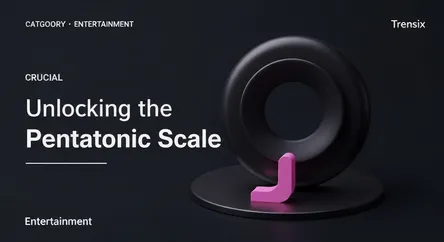Entertainment
Unlocking the Pentatonic Scale

Discover the pentatonic scale, the versatile five-note scale used in everything from blues to pop. Learn why it's a cornerstone of modern music.
What is it?
The pentatonic scale is a musical scale with five notes per octave, in contrast to the more common seven-note heptatonic scales like the major and minor scales. The most common types are the major pentatonic (equivalent to the 1st, 2nd, 3rd, 5th, and 6th degrees of a major scale) and the minor pentatonic. Its simple structure lacks the most dissonant intervals, giving it a consonant, open, and pleasing sound.
Why is it trending?
The pentatonic scale is perpetually popular because of its simplicity and versatility. It's often one of the first scales musicians learn, especially guitarists, as its patterns are easy to memorize and play. Its inherent lack of dissonance makes it a foolproof choice for improvisation in genres like blues, rock, jazz, and folk music. You can hear its influence in countless famous guitar solos and vocal melodies, making it a timeless tool for creating memorable music.
How does it affect people?
For aspiring musicians, the pentatonic scale is an accessible entry point into the world of soloing and songwriting, boosting confidence and creativity. For listeners, its universal presence in popular music creates a sense of familiarity and melodic satisfaction. The scale's structure often forms the backbone of catchy hooks and soulful riffs that resonate emotionally, making it a fundamental building block of songs people know and love.